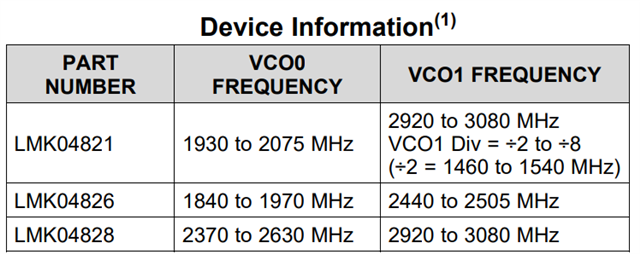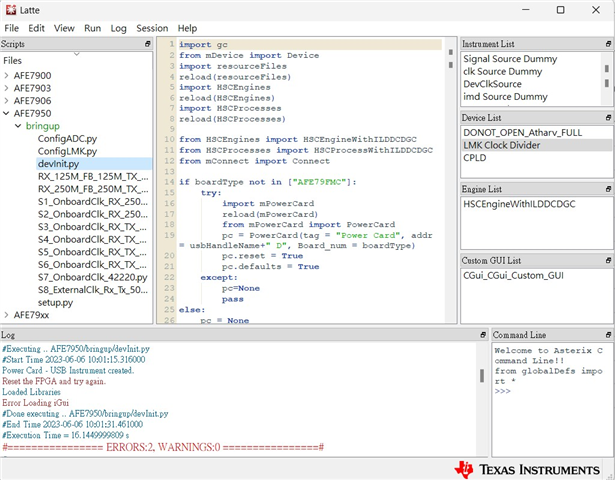Other Parts Discussed in Thread: LMK04828
Dear TI,
I made a ADC board which can receive external ref to LMK OSCIN ( PLL2 ref input )
It's OK for input 122.88 MHz for OSCIN.
But when I change from 122.88 MHz to 100 MHz
and buffered the modified latte bringup script ConfigLMK.py
It show error as below

ConfigLMK.py
sysParams=AFE.systemParams
sysParams.__init__();sysParams.chipVersion=chipVersion
setupParams.skipFpga = 1 # setup FPGA (TSW14J56) using HSDC Pro
############## Top Level ##############
sysParams.FRef = 500
sysParams.FadcRx = 3000
sysParams.FadcFb = 3000
sysParams.Fdac = 3000
sysParams.externalClockRx=False
sysParams.externalClockTx=False
############## Digital Chain ##############
##### RX #####
sysParams.ddcFactorRx = [24,24,24,24] #DDC decimation factor for RX A, B, C and D
sysParams.rxNco0 = [[4840,4840], #Band0, Band1 for RXA
[4840,4840], #Band0, Band1 for RXB
[4840,4840], #Band0, Band1 for RXC
[4840,4840]] #Band0, Band1 for RXD
##### FB #####
sysParams.ddcFactorFb = [24,24] #DDC decimation factor for FB 1 and 2
sysParams.fbNco0 = [4840,4840] #Band0 for FB1 and FB2
##### TX #####
sysParams.ducFactorTx = [24,24,24,24] #DUC interpolation factor for TX A, B, C and D
sysParams.txNco0 = [[4840,4840], #Band0, Band1 for TXA
[4840,4840], #Band0, Band1 for TXB
[4840,4840], #Band0, Band1 for TXC
[4840,4840]] #Band0, Band1 for TXD
sysParams.txEnable = [False,False,False,False]
############## JESD ##############
##### ADC-JESD #####
sysParams.jesdSystemMode= [1,1]
#SystemMode 0: 2R1F-FDD ; rx1-rx2-fb -fb
#SystemMode 1: 1R1F-FDD ; rx -rx -fb -fb
#SystemMode 2: 2R-FDD ; rx1-rx1-rx2-rx2
#SystemMode 3: 1R ; rx -rx -rx -rx
#SystemMode 4: 1F ; fb -fb- fb -fb
#SystemMode 5: 1R1F-TDD ; rx/fb-rx/fb-rx/fb-rx/fb
sysParams.jesdTxProtocol= [0,0] # 0 - 8b/10b encoding; 2 - 64b/66b encoding
sysParams.LMFSHdRx = ["24410","24410","24410","24410"]
# The 2nd and 4th are valid only for jesdSystemMode values in (0,2).
# For other modes, select 4 converter modes for 1st and 3rd.
sysParams.LMFSHdFb = ["12410","12410"]
sysParams.rxJesdTxScr = [True,True,True,True]
sysParams.fbJesdTxScr = [True,True]
sysParams.rxJesdTxK = [16,16,16,16]
sysParams.fbJesdTxK = [16,16]
sysParams.jesdTxLaneMux = [0,1,2,3,4,5,6,7] # Enter which lanes you want in each location.
# For example, if you want to exchange the first two lines of each 2T,
# this should be [[1,0,2,3],[5,4,6,7]]
##### DAC-JESD #####
sysParams.jesdRxProtocol= [0,0]
sysParams.LMFSHdTx = ["44210","44210","44210","44210"]
sysParams.jesdRxLaneMux = [0,1,2,3,4,5,6,7] # Enter which lanes you want in each location.
# For example, if you want to exchange the first two lines of each 2R
# this should be [[1,0,2,3],[5,4,6,7]]
sysParams.jesdRxRbd = [4, 4]
sysParams.jesdRxScr = [True,True,True,True]
sysParams.jesdRxK = [16,16,16,16]
##### JESD Common #####
sysParams.jesdABLvdsSync= True
sysParams.jesdCDLvdsSync= True
sysParams.syncLoopBack = True #JESD Sync signal is connected to FPGA
############## GPIO ##############
sysParams.gpioMapping = {
'H8': 'ADC_SYNC0',
'H7': 'ADC_SYNC1',
'N8': 'ADC_SYNC2',
'N7': 'ADC_SYNC3',
'H9': 'DAC_SYNC0',
'G9': 'DAC_SYNC1',
'N9': 'DAC_SYNC2',
'P9': 'DAC_SYNC3',
'P14': 'GLOBAL_PDN',
'K14': 'FBABTDD',
'R6': 'FBCDTDD',
'H15': ['TXATDD','TXBTDD'],
'V5': ['TXCTDD','TXDTDD'],
'E7': ['RXATDD','RXBTDD'],
'R15': ['RXCTDD','RXDTDD']}
############## LMK Params ##############
lmkParams.pllEn = True
lmkParams.inputClk = 983.04 # Valid only when lmkParams.pllEn = False
lmkParams.lmkFrefClk = True
setupParams.fpgaRefClk = 125 # Should be equal to LaneRate/40 for TSW14J56
############## Logging ##############
logDumpInst.setFileName(ASTERIX_DIR+DEVICES_DIR+r"\Afe79xxPg1.txt")
logDumpInst.logFormat=0x0 #Modify to 0x1 to save register scequence to log file. Script takes more time to execute.
logDumpInst.rewriteFile=1
logDumpInst.rewriteFileFormat4=1
device.optimizeWrites=0
device.rawWriteLogEn=1
device.delay_time = 0
#-------------------------------------------------------------------------------------------------#
setupParams.skipLmk = False
AFE.initializeConfig()
lmkParams.sysrefFreq = AFE.systemStatus.sysrefFreq
lmkParams.lmkPulseSysrefMode = False
AFE.LMK.lmkConfig()
ConfigADC.py
setupParams.skipLmk = True ## Initiates AFE79xx Bring-up AFE.deviceBringup() AFE.TOP.overrideTdd(15,3,15)
I check the LMK04828 datasheet ( page13 )
It show that 100 MHz OSCIN is allowed

And VCO can support up to 3080 MHz ( page1 )

Please help~
By the way, I can't load the latte igui
Is there a latest latte version ?


